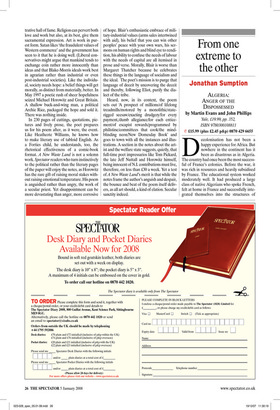Undoing the folded lie
Grey Gowrie
a neW WaSte land by Michael Horowitz New Departures, £25 (hardback), £15 (paperback), pp. 464, ISBN 9781906061098/ 9780902689183 When you buy this book (and buy you should for reasons that follow), try reading the notes to A New Waste Land before the poem itself. This is not because the poem is ‘difficult’ or in any sense obscure. On the contrary, Horowitz is an oral poet, a performer: veteran of his own Poetry Olympics and countless gigs over half a century in coffee bars or at the Albert Hall. A founder of late 1950s poetry-and-jazz occasions, he makes use of repetition, catch-phrases, comic-awful puns, message-hammering riffs. These give way to long lyric passages of seeming improvisation, in the manner of Coltrane or Rollins. The beautiful kite-flying sequence in the present work is one such example; a little lamenting passage for his late wife another.
At 72, Horowitz’s technique is closer to young rap artists, therefore, than to his contemporaries. Christopher Logue’s magnificent War Music is perhaps the exception, and Logue and Horowitz used to perform together. The reason for starting with the prose notes, which take up half the book, is that A New Waste Land is a long, anguished, polemical indictment of Tony Blair. You need to get in the mood, suspending disbelief if need be. Four other politicians of the Englishspeaking world — Margaret Thatcher, Bill Clinton, George W. Bush and Gordon Brown — are portrayed as monsters also. But Blair is the Shaftesbury of this modern Absalom and Achitophel. The poem is not, like Dryden’s, a satire, even though it is enlivened by illustrations from contemporary cartoonists like Trog, Garland, Scarfe, Brookes, Steve Bell (especially) and Posy Simmonds. It is more as if Blair, like Thatcher before him, had damaged Horowitz personally, threatened or undermined his vision of Albion and helped, paradoxically, to forge the poem’s style from its despair.
Horowitz is an old-fashioned visionary socialist in William Morris mode. This itself harks back to his poetic mentor, William Blake. Freud, too, follows Blake in the belief that work and sexual love give life its meaning; the poem is preceded by Horowitz’s illus trative hall of fame. Religion can pervert both love and work but also, at its best, give them sacramental expression. Art is work in purest form. Satan likes ‘the fraudulent values of Western commerce’ and the government has seen to it that he is doing well. (Liberal conservatives might argue that mankind tends to exchange coin rather more innocently than ideas and that Blake-Morris ideals work best in agrarian rather than industrial or even post-industrial societies). Like the individual, society needs hope: a belief things will get morally, as distinct from materially, better. In May 1997 a poetic rush of sheer hopefulness seized Michael Horowitz and Great Britain. A shallow buck-and-wing man, a political Archie Rice, packaged the hope and sold it. There was nothing inside.
In 230 pages of cuttings, quotations, pictures and lively prose, the poet prepares us for his poem after, as it were, the event. Like Heathcote Williams, he knows how to make literary use of tabloid English. As a Forties child, he understands, too, the rhetorical effectiveness of a comic-book format. A New Waste Land is not a solemn work. Spectator readers who turn instinctively to the political rather than the literary pages of the paper will enjoy the notes, as Horowitz has the rare gift of raising moral stakes without raising emotional temperature. His poem is anguished rather than angry, the work of a secular priest. Yet disappointment can be more devastating than anger, more corrosive of hope. Blair’s enthusiastic embrace of military-industrial values (arms sales intertwined with aid), his belief that you can win other peoples’ peace with your own wars, his sermons on human rights and blind eye to rendition, his ability to confuse the needs of labour with the needs of capital are all itemised in prose and verse. Morally, Blair is worse than Margaret Thatcher because he celebrates these things in the language of socialism and the ideal. The poet’s mission is to purge that language of deceit by uncovering the deceit and thereby, following Eliot, purify the dialect of the tribe.
Heard, now, in its context, the poem sets out ‘A prospect of millions/of lifelong treadmills/motored by a monolithic/staterigged seesaw/exacting drudgery/for every payment,/dumb allegiance/for each enticement/of escapist rewards/programmed by philistine/committees that cook/the mindblinding neon/New Domesday Book’ and goes to town with all the instances and illustrations. A section in the notes about the artist and the welfare state suggests, quietly, that full-time poet impressarios like Tom Pickard, the late Jeff Nuttall and Horowitz himself, being innocent of N.I. contributions must live, therefore, on less than £30 a week. Yet a test of A New Waste Land’s merit is that while the notes frame the author’s anguish and despair, the bounce and beat of the poem itself delivers, as all art should, a kind of elation. Secular sanctity indeed.



















































 Previous page
Previous page